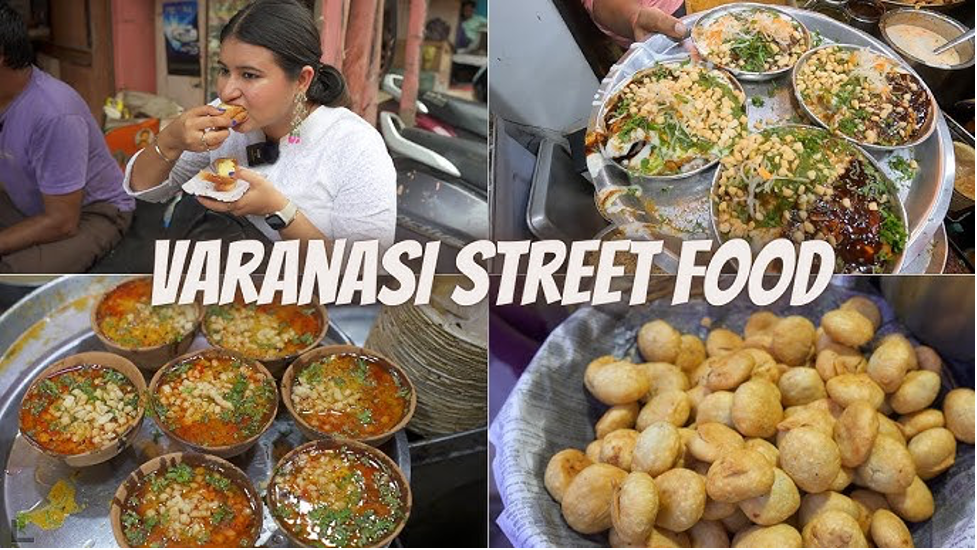
A Culinary Expedition Through Banaras: Unveiling the Street Food Treasures
As the sun dipped below the sacred waters of the Ganges, I found myself in the heart of Banaras, a city that pulsates with spirituality and a deep-rooted culinary culture. My journey through this ancient city was a sensory odyssey, as I embarked on a gastronomic adventure to explore Banaras’ famous street food. Join me on this epicurean expedition through the labyrinthine lanes of Banaras, where every bite tells a story of tradition, flavor, and soulful sustenance.

Arrival and the First Taste of Banaras
My Banaras food journey commenced as I arrived at Varanasi Junction, greeted by the tantalizing aroma of street food wafting through the air. I couldn’t resist my first indulgence – a piping hot samosa from a street vendor just outside the station. The crispy exterior gave way to a flavorful filling of spiced potatoes and peas, and I knew that my culinary adventure had begun on a delicious note.
The Ghat-side Breakfasts
Banaras is a city that wakes up early, and so did I, eager to dive into its gastronomic treasures. My day started with a visit to the Dashashwamedh Ghat, where I savored a classic Banarasi breakfast – piping hot kachori with spicy aloo sabzi. The crunch of the kachori paired with the flavorful potato curry created a symphony of textures and tastes that set the tone for the culinary journey ahead.
The Mystical Magic of Malaiyyo
In the heart of the city, I stumbled upon a hidden gem – the elusive Malaiyyo. This frothy, cloud-like dessert is a winter specialty in Banaras. I followed the recommendation of a local and found myself in a narrow alley near Jangambari Math. There, a kind vendor served me a portion of the ethereal Malaiyyo, garnished with saffron and pistachios. Its delicate sweetness and melt-in-the-mouth texture left me mesmerized.
Chai Breaks and More
Banaras runs on chai, and I found myself immersed in the ritual of sipping steaming cups of ginger-infused tea. One particular chai stall near the Manikarnika Ghat offered not just tea but also delightful, crispy pakoras. The combination of the warm, aromatic chai and the spicy, crunchy pakoras was a perfect afternoon pick-me-up.
The Iconic Blue Lassi
Banaras is famous for its lassis, and the Blue Lassi Shop in the heart of the city is a must-visit. I tried their classic lassi, a blend of yogurt, sugar, and spices, topped with a dollop of cream. The thick, creamy texture and the delightful sweetness were incredibly satisfying. The shop’s charming ambiance, adorned with messages from travelers around the world, added to the experience.
Sankat Mochan Hanuman Temple Feasting
After a visit to the revered Sankat Mochan Hanuman Temple, I ventured to the temple’s adjoining food stalls. The temple’s prasad, a mix of spicy chana masala, puris, and boondi ladoos, was a spiritual and culinary treat. The flavors were a harmonious blend of spices and sweetness, and the meal left me feeling spiritually nourished.
The Mystique of Paan
No visit to Banaras is complete without trying the iconic Banarasi paan. The paan vendors in the bustling streets offered an array of paan varieties, and I couldn’t resist indulging. The vendor deftly prepared my paan, folding it into a neat triangle, and handed it to me with a warm smile. The burst of flavors in my mouth – from betel leaf to areca nut and aromatic spices – was an unforgettable experience.
The Chaat Extravaganza
One sunny afternoon, I ventured to the crowded streets of Godowlia, known for some of Banaras’ best chaats. The crisp papdi chaat, tangy tikki chaat, and the spicy tamatar chaat left my taste buds dancing with joy. The variety of textures and flavors was a delightful symphony, and I couldn’t resist seconds.
The Sweet Treats of Banaras
Banaras is renowned for its sweets, and I dedicated a day to explore its sweet shops. Raja Ram Lassi Wale, an iconic shop, offered a variety of traditional sweets like malpua, rabri, and peda. Each bite was a burst of sweetness, and the warmth of the shop’s owner made me feel like family.
The Morning Serenity at Assi Ghat
My final morning in Banaras was spent at Assi Ghat, where I indulged in a simple yet delicious breakfast of aloo puri and steaming cups of ginger chai. The serene ambiance of the ghat, coupled with the flavorful meal, made it a perfect conclusion to my culinary journey.
Conclusion: A Journey Through Flavor
As I bid farewell to the mystical city of Banaras, I couldn’t help but reflect on the culinary treasures it had unveiled. From street-side samosas to the ethereal Malaiyyo, Banaras had been a revelation of flavors and traditions. Each vendor, each stall, and each dish had a story to tell, a testament to the rich culinary heritage of this ancient city. Banaras had welcomed me into its bustling lanes and its diverse kitchens, leaving me with a deep appreciation for its culinary culture and the warmth of its people. It was a journey that had touched not only my taste buds but also my heart, reminding me that food is not just sustenance; it is a celebration of life, culture, and the shared experiences that connect us all.



